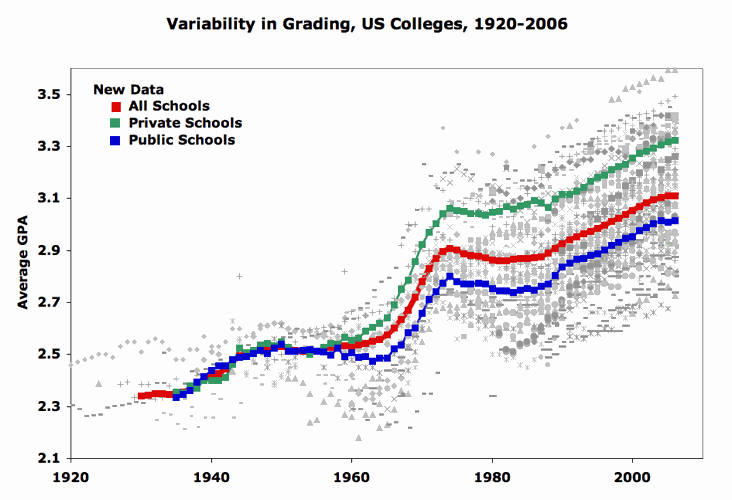ハーバードの卒業生がウォールストリートに行くことについての非常に的確な記事だ。他のトップ校や、日本の有名大学についても同様のストーリーは当てはまるだろう。
Why Do Harvard Kids Head to Wall Street?
まずは、卒業生の一般的な性質を挙げている:
(a) is very good at school; (b) has been very successful by conventional standards for his entire life; (c) has little or no experience of the “real world” outside of school or school-like settings; (d) feels either the ambition or the duty to have a positive impact on the world (not well defined); and (e) is driven more by fear of not being a success than by a concrete desire to do anything in particular.
- 勉強ができる
- 一般的な基準に照らして常に成功してきた
- 学校やそれに近い世界以外での経験がほとんどない
- (なんとなく)社会のためになりたい・ならないといけないと思っている
- 具体的に何かをやりたいというよりも成功出来ないことを恐れている
ステレオタイプではあるが非常に的を得ているように思う。自分が大学出る前も何をやりたいという具体的な目標がなかった。自分な好きな学問をやるべきだと漠然と思って大学に入ったが、これがやりたいというものは見つからず、これはつまらない・もういいというリストばかりが増えるばかりだった。結局、公共政策というところに行った。今思えば、それはまさに公共=なんとなく社会のためになるからと、それなら誰にも後ろ指を指されないからだろう。
Their (our) decisions are motivated by two main decision rules: (1) close down as few options as possible; and (2) only do things that increase the possibility of future overachievement.
では学生はどのような判断基準を持っているのか。
- なるべくオプションを減らさない
- 将来成功するための可能性を上げる
日本でいえば終身雇用型の企業はオプションがなくなるから避けつつも、やりたいことがないので何となくいいとされている場所にいくことになるだろう。外資系金融・コンサルや公務員なんて分かりやすい例だ(実際に公務員に転職能力があるかは知らないが、就職する学生はみんなあると思っている)。
Money is far down the list; at this point in their lives, if you asked them, many of these people would probably say that they only need to be middle or upper-middle class, and assume that they will be.
これも完全に正しい。多くの学生は別に給与をそこまで重視していない。それなりにいい生活=アッパーミドル以上であればよく、そして自分はそうなると思っている。
ではなんで、金融やコンサルを目指すのか。
The recruiting processes of Wall Street firms (and consulting firms, and corporate law firms) exploit these (faulty) decision rules perfectly. The primary selling point of Goldman Sachs or McKinsey is that it leaves open the possibility of future greatness.
彼らは学生=過去の自分たちの(おかしな)思考プロセスを熟知していてそれを利用するわけだ。
The idea is that you will get some kind of generic business training that equips you to do anything, and that you will get the resume credentials and connections you need to go on and do whatever you want.
数年働くことでいいトレーニングになりレジュメに大きく書けるし、コネもできると言って誘いこむ。
And to some extent it’s true, because these names look good on your resume, and very few potential future employers will wonder why you decided to go there.
そしてこれらは別に間違っているわけではない。実際にいいトレーニングではあるだろうし、レジュメ的には素晴らしい。コネも増える。
The second selling point is that they make it easy. Yes, there is competition for jobs at these firms. But the process is easy.
もうひとつのやり口は、採用活動を分かりやすくすることだ。競争は激しいが、どうやってアプライすべきかは簡単に分かる。プロセスが非常にはっきりしている。
For people who don’t know how to get a job in the open economy, and who have ended each phase of their lives by taking the test to do the most prestigious thing possible in the next phase, all of this comes naturally.
これは現実の社会でどうやって仕事を見つけるのかを知らず、生まれてこのかたテストでいい点を取って次に進むという人生を送ってきた若者にとってとても自然だ。競争自体はそれほど問題ない。単に難関校を受験するようなものだ。日本であれば国家公務員も同様だろう(アメリカでは公的仕事のキャリアパスはそこまで単線ではない)。
The third selling point — not the top one, but it’s there — is the money. Or, more accurately, the lifestyle.
三つめはライフスタイルの提示だ。豪華なエリートとして生活を見せつけることで最後のひと押しが完了する。
では学生がこの手の業界にいくとしてどうしてそこに留まるのか。
Your expenses grow to match your income. As the decades pass and you realize that no, you’re not going to save the world, the money becomes a more and more important part of the justification.
それは支出が収入に応じて伸びていくからだ。何年働いてお金を貯めて事業を起こすないし引退するといっていた人が、同僚や同業者に合わせて高級車を購入し贅沢な暮しをするようになり、いつのまにかそこから抜け出せなくなる(もちろん、別にそれが悪いという話ではない)。
And when you have kids, you’re stuck;
子供ができればそこで終わり。もう生活スタイルを大きく変えるのはほぼ不可能になる。
More importantly, you internalize the rationalizations for the work you are doing.
もうひとつの原因は自分の中での合理化だ。自分の仕事は世界を救っているんだと思い込む。もちろんたいていの仕事は社会のためになっているわけだが、途中をすっ飛ばしてそれが自分にできる一番の社会貢献なんだという風になっていく。学者でも同じだろう。貧困を解決したくて開発について研究していたはずが、ジャーナルに論文を載せることが自分にできる最大の貢献だと思うようになる(実際そうである場合もあるだろうが)。
And individually, I have nothing against them, although I do think they should do their best to keep their expenses down so they will be able to switch careers later.
本題とは離れるが本文中この一節の内容はとても共感できる。好きなことをやるためには少ないお金でも暮らせる必要がある。収入が増えたときに支出をそのまま増やしているといざ何かがやりたいときにそれができなくなるからだ。
